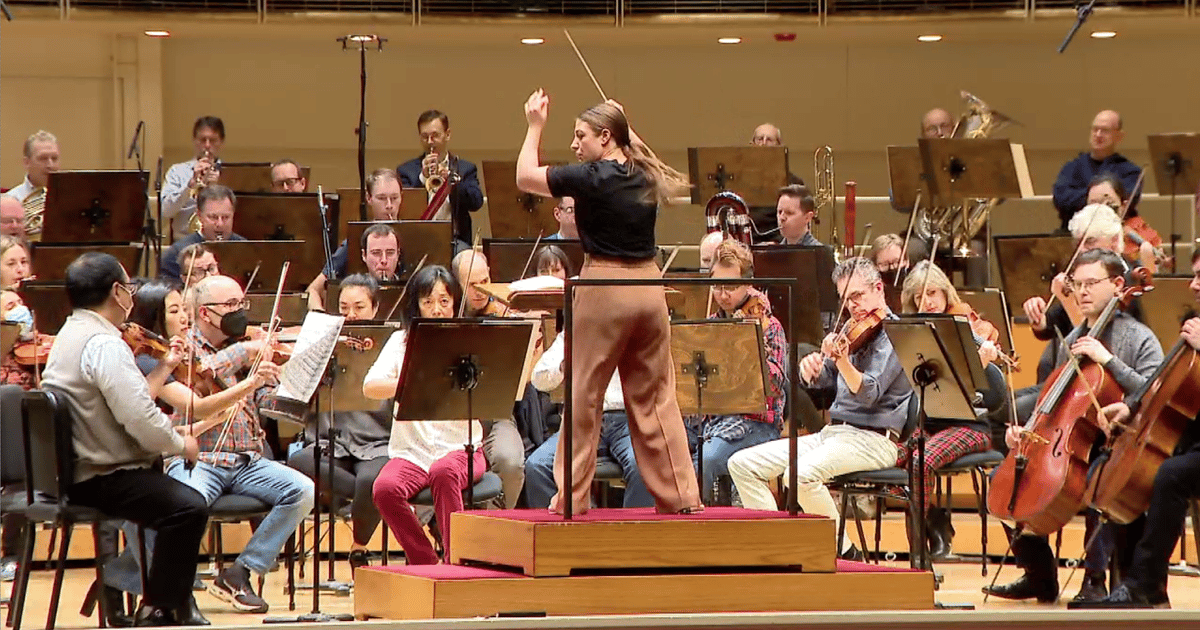‘It’s easier to play pro sports than pass an orchestra audition’
mainJanelle Gelfand in Cincinnati has written one of the best inside accounts we’ve seen of the medieval torture that has been reinvented as the audition for new orchestral players.
“From a statistical chance, it’s probably easier to get into the NBA,” said Christian Colberg, principal viola of the Cincinnati Symphony. “It’s a very tough process, a process that sends people to therapists, and that truly changes your life. It’s almost barbaric, but it is absolutely fair.”

Read the full feature here.





I think there are more orchestra players than professional basketball players.
The numbers…
There are 450 NBA players (30 teams x 15 players) in the US.
There are about 18 full-time Symphony Orchestras here so lets say 90 players x 18 orchestras = 1620
If we consider that an orchestral career is much longer than an NBA career, it evens out a bit as individuals enter and leave that set of 450 NBA player at a faster pace.
None-the-less, making it to the NBA is extremely rarefied territory against enormous competition. Only 60 people per year get drafted to “audition” and only about half of those will be signed to a job.
Well, one additional benefit the NBA has is that out of the “60 people per year [who] get drafted to “audition””, at least some will be signed, whereas an orchestra might invite 60 people every six months for six years, without signing a single person.
An orchestra “might” do that but it’s so rare as to not be a factor among the thousand or so career places we are talking about. I’ll guess that it is beyond even rare for section viola player openings such as the article discusses.
They will sign someone eventually since they need the slot filled and someone will be hired temporarily to fill that slot until they do.
Sorry, I should say that when I was thinking of what an orchestra might do, I had the orchestras closer to home in mind (Germany). I gather that the top American orchestras, on average, have a lower number of “inconclusive auditions” than the top orchestras in Germany.
Not True.
Some orchestra will take as much as 3 years or to replace a principle player. The chair is often filled in the mean time by the associate principle player, and the chair shuffle happens, and a casual player (who is already on the call list) is brought in to play.
Inconclusive auditions are actually very common with the ‘celebrated orchestras’.
I know very high level players where orchestral auditions have never proceeded past the second round, despite highly capable players.
Orchestras aren’t looking for ‘potential’ the way that sports teams are. They’re looking for players who are magic, polished and in their prime, with bucket load of experience with other orchestras etc.
Anyone know what the annual number of openings for full-time US orchestras spots is?
The point is that you have to overcome a lot of tough competition to win a job in a good orchestra, just like you do to win a spot on a professional sports roster.
One important difference: In sports, a good new player can push out the veteran who isn’t quite as good anymore. If the NBA worked the way orchestras do, when Michael Jordan appeared, if every team had had a shooting guard, they would have said “You’re good, kid, but we already have a shooting guard.” In the orchestra world, there are a lot of great players looking for jobs who are much better than some of the people now working, but if there’s no vacancy, they’re out of luck. Someone who plays for 50 years instead of 25 likely cost some really good player a 25-year career.
1) I don’t think in auditions you have to be naked and prodded and examined by the music director. “Hmmm, can he sit for 2 hours?”
2) Orchestras should able to trade musicians. “We’ll trade you a principal clarinet for two second violins.”
Hahahaha. It is the sitting that kills you, especially if you’re a string player. Try sitting for 1:30, 3x a day, at a time that you do not get to choose. Go for it 3-4 days in a row. Hahahaha thanks for your post.
Mr. Colberg from his secure position omits pointing out that often “politics” are involved in getting the job . Of course the denial that politics oft enters the game will always be roundly
denied by all concerned,it’s the nature of the beast…..
To compare getting an orchestra job with making it to the NBA is stupid.
Every single boy growing up plays basketball. If there is talent there, they will play for their junior high team. If there is higher talent, they will play for their high school varsity team. If there is truly elite talent there, they will be on the starting lineup of a D-1 University. If they distinguish themselves in this truly amazing group, they will be drafted by an NBA team.
By comparison, a small number of kids take music lessons. Everyone makes it to their high school orchestra. Making it into a top conservatory takes a little more, but still isn’t that difficult. At a top music school, most graduates have the chops necessary to win an orchestra position. Maybe they have to try several times, maybe they have to settle for a lesser orchestra than they aspired to, but it should work out for most. If it doesn’t, they were probably borderline to even major in music in the first place.
It’s possible and likely that the greatest musical talents never even have a first lesson. It’s quite unlikely that there is someone with Lebron’s talent lying undiscovered somewhere.
What uninformed nonsense from Ross and Player
Ross, the NBA is around 80% African American, so it is obvious that the best “basketball talents” don’t always try for the NBA, since many parents in the Asian, White… communities don’t push basketball as a profession. In Classical music, talent is being taken from around the globe. I can guarantee you that there are more people in China trying to make it as classical musicians, then basketball players.
I have no idea what you’re trying to convey.
Most Chinese music performance majors can find a position in a Chinese orchestra.
Most American music performance majors can find a job in an American orchestra. Sorry if it’s in Toledo and not Boston.
In AMERICA, every single boy will play basketball in phys ed class when they are young. Those with aptitude will take it to the next level. Yea, some are tall, some are black, what does that have to do with anything? Are you saying there is an Asian kid who could have been as good as Lebron but isn’t because he was too busy with music lessons? Nonsense.
The two endeavors are so fundamentally different in many important ways that all attempts of direct comparison make practically no sense at all. The only thing we know with certainty is that financial rewards are vastly unequal and not in musicians’ favor.
The orchestral player is not in the same league as the “pro sports player “. Especially
in the string sections where they are a dime a dozen easily replaceable though they would love to have us think otherwise . During a “pro sports player ” game (performance) there is greater creativity required of the sports player than the demands put on an orchestral player who is but part of a hopefully well oiled machine .
By the same token, a pro sports player is not in the same league as a good orchestral player when it comes to amount of knowledge and skills that are required. The “machine” is only as “well oiled” as the quality of players that are in it. By the way, best pro teams are often compared to well-oiled machines as well. My experience shows that good orchestral players, even in string sections, are not as easily replaceable as it may seem. Conversely, in pro sports every new generation achieves a little bit more than previous, so the “replacements” are doing quite well there. Essentially, arts and sports have so many important differences that direct comparisons between them are meaningless.
You are correct, the comparison is pointless except to note that perhaps the athlete has
a more spontaneous creative life whereas the orchestra player has none ,always being
the bridesmaid, never the bride ,especially the majority of fiddle players who one suspects
at their beginnings set their sights higher than being an orchestral player .
On the other hand, good orchestral playing is much more demanding in terms of precision and synchronization. Look how many missed shots and turnovers happen in every NBA game (up to triple digits sometimes), not to mention countless defensive errors, and compare with the number of wrong notes and missed entrances in a performance of a good orchestra (usually in single digits only). Those are some of the huge differences that make meaningful comparisons impossible.
Precisely because an orchestra career can last for decades, very few openings occur each year. So counting the number of NBA players vs. orchestral players is not an accurate representation of how many positions come open each year. Take tubists or harpists for example. There is customarily only one position per orchestra, and it may be a year or two or much more before there are openings in these one off positions. That would include some woodwind players, percussionists, you get the picture.
There are also far fewer people majoring in those instruments in conservatories.
The schools usually have enough to have two orchestras.